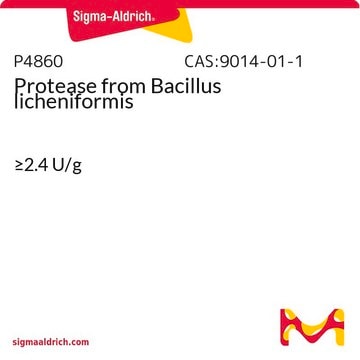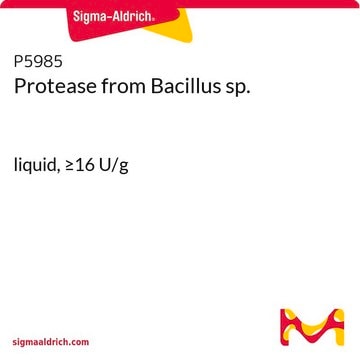P2143
Protease from Aspergillus saitoi
Type XIII, ≥0.6 unit/mg solid
Synonim(y):
Molsin
Zaloguj sięWyświetlanie cen organizacyjnych i kontraktowych
About This Item
Polecane produkty
pochodzenie biologiczne
Aspergillus sp. (Aspergillus saitoi)
typ
Type XIII
Postać
solid
aktywność właściwa
≥0.6 unit/mg solid
obecność zanieczyszczeń
alkaline protease, essentially free
temp. przechowywania
−20°C
Zastosowanie
Protease from Aspergillus saitoi has been used in a study to assess sequence coverage and resolution in hydrogen exchange of large proteins. It has also been used in a study to investigate the conversion of soybean curd isoflavone glycosides to their aglycones through β-glucosidase..
Działania biochem./fizjol.
Protease from Aspergillus saitoi was shown to also function as a β-glucosidase.
Definicja jednostki
One unit will hydrolyze hemoglobin to produce color equivalent to 1.0 μmole (181 μg) of tyrosine per min at pH 2.8 at 37 °C (color by Folin-Ciocalteu reagent).
This page may contain text that has been machine translated.
Hasło ostrzegawcze
Danger
Zwroty wskazujące rodzaj zagrożenia
Zwroty wskazujące środki ostrożności
Klasyfikacja zagrożeń
Eye Irrit. 2 - Resp. Sens. 1 - Skin Irrit. 2 - STOT SE 3
Organy docelowe
Respiratory system
Kod klasy składowania
11 - Combustible Solids
Klasa zagrożenia wodnego (WGK)
WGK 3
Temperatura zapłonu (°F)
Not applicable
Temperatura zapłonu (°C)
Not applicable
Certyfikaty analizy (CoA)
Poszukaj Certyfikaty analizy (CoA), wpisując numer partii/serii produktów. Numery serii i partii można znaleźć na etykiecie produktu po słowach „seria” lub „partia”.
Masz już ten produkt?
Dokumenty związane z niedawno zakupionymi produktami zostały zamieszczone w Bibliotece dokumentów.
Klienci oglądali również te produkty
E Ichishima
Bioscience, biotechnology, and biochemistry, 64(4), 675-688 (2000-06-01)
This review covers the unique catalytic and molecular properties of three proteolytic enzymes and a glycosidase from Aspergillus. An aspartic proteinase from A. saitoi, aspergillopepsin I (EC 3.4.23.18), favors hydrophobic amino acids at P1 and P'1 like gastric pepsin. However
F J Moralejo et al.
Applied microbiology and biotechnology, 54(6), 772-777 (2001-01-11)
A gene encoding the sweet-tasting protein thaumatin (tha) with optimized codon usage was expressed in Aspergillus awamori. Mutants of A. awamori with reduced proteolytic activity were isolated. One of these mutants, named lpr66, contained an insertion of about 200 bp
E Skyttä et al.
The Journal of applied bacteriology, 74(2), 134-142 (1993-02-01)
The broad-spectrum antibacterial activity exhibited by three Pediococcus strains isolated from beer was preliminarily characterized. Factors affecting the production rate of bacterial inhibitors were screened and the effects of simultaneous cultivation of Lactococcus and Pediococcus on the production of inhibitory
R E Cardoza et al.
Biotechnology and bioengineering, 83(3), 249-259 (2003-06-05)
A copy of the bovine chymosin gene (chy) with a codon usage optimized for its expression in Aspergillus awamori was constructed starting from synthetic oligonucleotides. To study the ability of this filamentous fungus to secrete bovine prochymosin, two plasmids were
Isolation and characterization of mutants of Aspergillus niger deficient in extracellular proteases.
I E Mattern et al.
Molecular & general genetics : MGG, 234(2), 332-336 (1992-08-01)
In the present study, the extracellular protease activity in a strain of the filamentous fungus Aspergillus niger was investigated and mutant strains deficient in the production of extracellular proteases were isolated. The major protease, which is responsible for 80-85% of
Nasz zespół naukowców ma doświadczenie we wszystkich obszarach badań, w tym w naukach przyrodniczych, materiałoznawstwie, syntezie chemicznej, chromatografii, analityce i wielu innych dziedzinach.
Skontaktuj się z zespołem ds. pomocy technicznej












